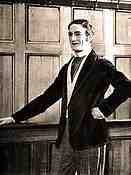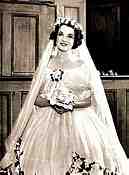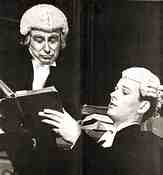You are here: > > Plot Summary

DRAMATIC Cantata; text by W. S. Gilbert; music by Sir Arthur Sullivan. First produced, March 25, 1875, at the Royalty Theatre, London.
This delightful work was the first product of the regular collaboration of Gilbert and Sullivan. Though called a "Dramatic Cantata," it is, in its perfect union of tuneful music and clever words, a direct forerunner of the more famous later successes of this inimitable pair, and is equally well worth knowing. "Trial by Jury" is their only work entirely without spoken dialogue.
THE LEARNED JUDGE, Baritone
COUNSEL FOR THE PLAINTIFF, Tenor
THE DEFENDANT — EDWIN, Tenor
FOREMAN OF THE JURY, Bass
USHER, Baritone
THE PLAINTIFF — ANGELINA, Soprano
Scene: A Court of Justice. Curtain rises on Chorus of Barristers, Attorneys, and Jurymen with Ushers.
The chorus, in their sturdy song, make known the course of events:
- For, today, in this arena,
- Summoned by a stern subpoena,
- Edwin—sued by Angelina—
- Shortly will appear.
The Usher, having marshaled the Jurymen into the Jury-box, gives them the judicial counsel to heed the plaintiff, "The broken-hearted bride," and not "the ruffianly defendant," for,
- From bias free, of every kind,
- This trial must be tried.
(1939)
The Judge, having thanked them proceeds to tell how he reached his exalted station. When young, he was an impecunious lawyer,
- So, he fell in love with a rich attorney's
- Elderly, ugly daughter.
The attorney turned plenty of cases over to him, and when he had grown "rich as the Gurneys'" he threw over the "Elderly, ugly daughter." But now he's a Judge, "it was managed by a job," and ready to try this breach of promise case.
(1939)
- . . . deceived a girl confiding,
- Vows, et cetera, deriding.
And when the Plaintiff wished to name the day, he left her,
- Doubly criminal to do so,
- For the maid had bought her trousseau!
Counsel and Jurymen join in singing to the Plaintiff "Cheer up!" while she sighs "Ah me!" a la Italian opera. The Plaintiff reels as if to faint and falls sobbing on the Foreman's breast, but when the Judge approaches she leans on him instead. Edwin attempts to defend himself from their charge of "Monster!" saying,
- Of nature the laws I obey,
- For nature is constantly changing.
and concludes by granting that
- If it will appease her sorrow,
- I'll marry this lady today,
- And marry the other tomorrow!
- Oh, see what a blessing, what love and caressing
- I've lost, and remember it, pray,
- When you, I'm addressing, are busy assessing
- The damages Edwin must pay.
- Though homeward as you trudge,
- You declare my law is fudge,
- But of beauty I'm a judge.
To this all reply:
- And a good judge, too!
Page updated 10 November 2004


